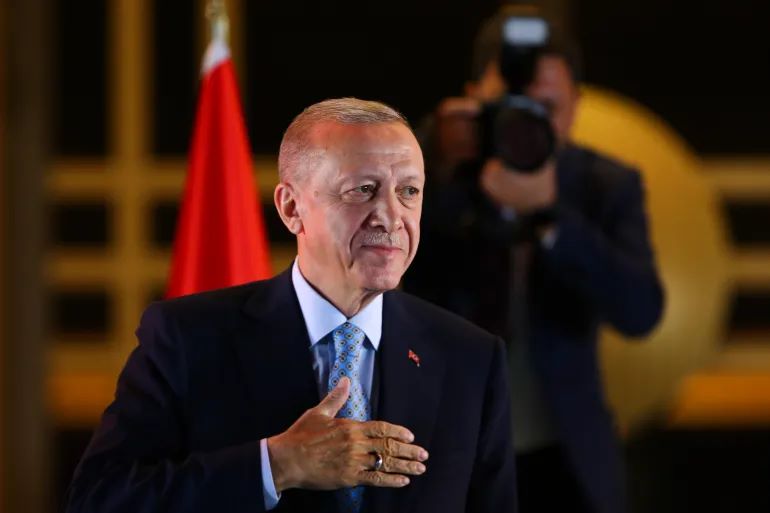
[Al Jazeera]
Turkiye President Recep Erdogan’s electoral win has been celebrated but will he continue to maintain formal ties with the brutal Israeli regime, asks Iqbal Jassat.
Recep Tayyip Erdogan has always been an enigma for Muslims in the world; endearing in the manner he relates to Islamic norms and values, but complex and controversial with regard to geopolitics in respect of NATO, Syria and Palestine.
Muslims familiar with Erdogan’s past will recall that in 1998 when he was the Mayor of Istanbul, he was sentenced to 10 months in prison and banned from politics for reading the following lines from a poem:
“The mosques are our barracks,
the domes our helmets,
the minarets our bayonets,
and the believers are our soldiers.”
Notwithstanding the punishment he endured, Erdogan whose ruling AK Party is rooted in what is understood as “political Islam”, has studiously over time, overturned decades-old restrictions imposed on Islam by Kemal Ataturk.
A remarkable achievement indeed to place Islam in the centre-stage of Turkiye’s social, cultural and political life, given Ataturk’s overwhelming secularism and the iron-clad grip held by the military.
Not surprising therefore that a Greek weekly Siosros newspaper harbours resentment and blatant hatred against Erdogan’s efforts.
For instance in its weekend issue, it lamented that Turkiye (under Erdogan) is leading what it disparagingly described as “leading the rudder of the worn-out ship of Islam, and this ship is still very dangerous despite its decline”.
It goes further by arguing that because “Islamic thought is still rooted in the minds of Muslims”, this it claims “in itself is a danger to Western countries as a whole.”
It added that while the West held “absolute control” over rulers of Muslim countries, Erdogan emerged as “an Islamic force outside the flock of control…”.
However the question Muslims will be asking is whether in fact Erdogan is able to delink from any external sphere of influence, if at all.
Turkiye straddles strategic geographical areas across East and West and pragmatism will dictate that to be disconnected economically and politically is not realistic.
But it does not imply that Erdogan will insulate Turkiye from the shift occurring in global reconfiguration which is evident in the unfolding of America’s unipolar status to a multipolar world pushed by Russia and China.
In any event the most crucial change expected by Muslims in general and Palestinians in particular, relates to the continued dispossession, violent repression, bombings, massacres and illegal Occupation of Palestine.
The Judaisation of Al Quds, the repeated incursions in Al Aqsa and the siege of Gaza, does not warrant Erdogan’s embrace of Israel, is an expectation Muslims across the world cherish.
Normalisation with Israel is viewed as a serious regression of the promise Erdogan held up when he stood up against Israeli “baby killers”. To have adopted a complete reversal by re-establishing ties with the same colonial regime of killers has been viewed as a betrayal.
The other contentious policy which has not sat well with Muslim public opinion is Erdogan’s role in the destabilisation of Syria. Occupying strategic areas of Syria remains a stigma which will not be erased until and unless he evacuates his military.
The challenges Erdogan faces notwithstanding his current victory are manifold. Domestically he is confronted with an economy and currency in free fall. Opposition coalition may have suffered a bruising defeat but it doesn’t mean that a sizable portion of Turkiye’s population who voted against him will disappear into thin air.
The Ukraine/Russia conflict and Turkiye’s membership of NATO will not allow Erdogan to keep walking the thin edge of the wedge. To date he’s been able to walk a tightrope without falling off the cliff but whether this posture will be sustainable is anyone’s guess.
While the world awaits Erdogan’s inauguration, global Muslims will eagerly hope that he re-reads the poem which landed him in jail – with greater conviction and matched with action.
*Iqbal Jassat is an Executive of the Media Review Network, Johannesburg.


